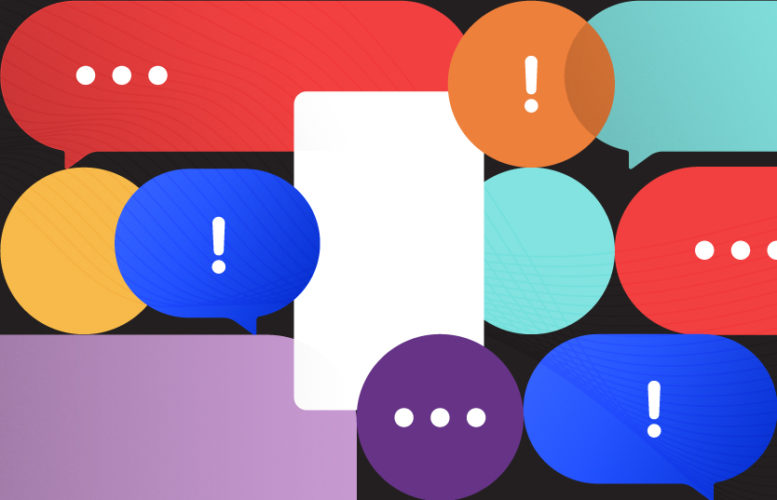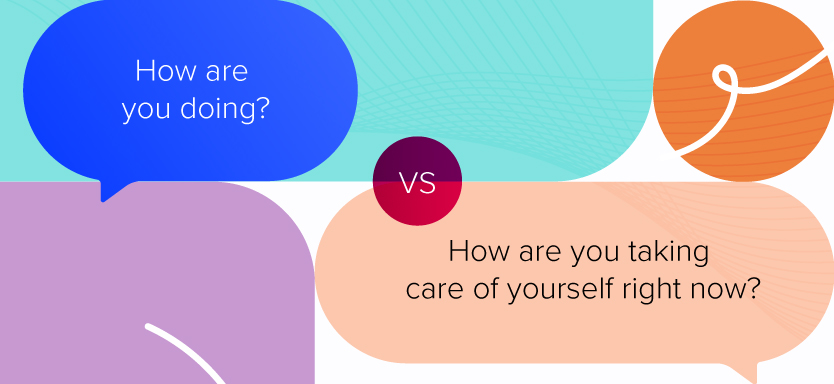How to have conversations that really count
March 30, 2021
11 min read
We spoke with broadcaster and author Riaz Meghji about how to build stronger connections with those in your life.
Riaz Meghji is a natural expert when it comes to good conversation and making connections with people, having interviewed an array of personalities in the arenas of sports, entertainment, politics, and current affairs. He has been a host for CityTV’s Breakfast Television, MTV Canada, TedxVancouver, CTV News, and the Toronto International Film Festival.
Beyond his broadcast career, Meghji is a philanthropist and says “giving is life.” He has advocated for and supported charities such as the Canuck Place Children’s Hospice and Covenant House Vancouver.
By taking a look back at Meghji’s 2012 TedxSFU talk, you will quickly learn that he sees conversations as pathways to some of the most unexpected events in life. Meghji often brings levity and laughter to his interviews, but says he is most inspired by stories about overcoming struggle and the feeling of being alone.
For several years, Meghji had been researching the impact of loneliness and feeling isolated within an emotion or experience. While he was continuing to gather information, the pandemic hit. That’s when Meghji wrote Every Conversation Counts: The 5 Habits of Human Connection That Build Extraordinary Relationships.

As an exploration of reams of research and his own experiences, Meghji’s writing aims to answer the big question of why so many of us feel lonely in this age of technological connection. His book speaks to the added pressures of isolation in lockdown while advocating for something called empathetic curiosity. “You never know what someone might have to teach you. You never know which conversation will be the most important in your life,” he writes.
Every Conversation Counts is getting praise for providing accessible ways to connect more deeply with people you meet, work with, want to get to know, or already care about—even in online environments. Speaking for myself, these are tips that are woefully needed. The most profound human interactions seem to have occurred in the pre-pandemic past.
Meghji’s strategies offer hope for building connection and ways for making once-in-a-lifetime conversations happen. Read on to learn more in our interview.
This interview has been edited for brevity and clarity.
Charitable Impact: Tell me how you became interested in studying the power of human connection?
Riaz Meghji: The whole intention of why I do what I do for a living and having the opportunity to interview people on television for a living really comes down to the fascination of how and why we connect. Everyone has a personal story, and a piece of adversity to share, and I always found [that] inspirational. Yet, the common thread I would see with people I interviewed—especially those that struggled a great deal—was what it meant to suffer in silence and how shame can put you in a hole.
Over the years, as these kinds of courageous reveals became apparent, what really stood out to me was what it feels like to be alone, and the shame and embarrassment that comes with it. So, for the past few years, I had been researching the impact of loneliness on all of us.
There was a strong matchup between the power of human connection and how we combat isolation and loneliness that I had been putting together even before the pandemic began. In the past year, the pandemic just created a huge sense of urgency on how we connect given the fact that it has accelerated these feelings of loneliness and isolation.
My intention and goal was to create a resource that could help people just connect on deeper levels and get past the small talk, which really is just a defense mechanism to prevent ourselves from becoming emotional in front of people we don’t know. That aspect of revealing that realness is how we’re really going to connect. That’s what I believe we all need right now and I am hoping this book helps people do just that.
CI: That common question of “How you are doing?” is totally different these days. Do you think people are allowing yourself more vulnerability?
RM: Yes and no. And here is my twist on that question of “How are you doing?” or “How are you coping?” I love flipping that question and asking, “How are you taking care of yourself right now?” Because there are a lot of choices we can make during this time, especially a difficult time where you could feel lonely, you could feel overwhelmed, you could feel anxious, you could feel socially awkward. The valuable question is to encourage people to focus on the control we could have to help people recharge their batteries.

Sometimes when we just say “How are you doing?”, especially in a group setting or a virtual meeting, it can be overlooked. People just give one word answers and then you move on with your agenda. We are missing that opportunity to truly check in with people. So I love to ask that question of “How are you taking care of yourself?” Or maybe even “How would you describe your relationship with yourself right now?” And following the emotion that they are giving and seeing how we can support them.
CI: Is conversation the main tool for combating loneliness?
RM: [It’s] intentional social connection and there is a big difference between intentional social connection versus social information. If we are using the tool of technology or social media for just releasing highly curated information or social or personal highlight reels to protect ourselves from revealing what’s really going on, that’s going to amplify loneliness. Intentional social connection is what we need right now to break through this.
How we go first with our real selves is so valuable to help others who then have the permission to do the same. Let’s open up and share, let’s ask questions and have conversations that are going to help people feel more connected.
CI: What about introverts? How can they approach those deeper conversations?
RM: Something I encourage leaders to do if they are asking how to connect with someone who might be an introvert or who was onboarded remotely is never losing sight of the value of the one-on-one.
Check in with that person one-on-one and see how they are doing and navigating through their emotions. Then bring them into the group conversation and they have a champion in their corner to prop them up.
CI: Agreed. I feel like I connect more with people when we have one-on-one conversations about our lives, our families, our hobbies, our passions.
RM: What are the most valuable things that people want to talk about? It’s career, it’s health, but above all it’s relationships. That’s where the emotion lives, in the relationship. Tell me about your partner, your pets, your loved ones. When people start opening up about that it’s how we lean in, listen, and support them.
CI: Do you think that conversation can inspire empathy and action?
RM: Empathy is a huge piece of this. Empathetic curiosity can inspire the action. If we are talking to someone and they are going through something. Excuses are real for people, but it’s easy for us—if we’ve heard excuses—to just dismiss them.
Empathetic curiosity I believe is driven by discovery over dismissal. If we get caught in our patterns, we’ve closed ourselves off from truly understanding or learning about what this person needs in front of us. Because their excuses are real.
Without empathetic curiosity, it can be so easy for us to fall into the you versus me—especially if there are different perspectives—instead of you and me versus the problem.
CI: Yes, those conversations can also help people find causes they care about and want to support in the long-term.
RM: It makes me think of the organizations I personally like to support. One of them is Canuck Place Children’s Hospice. I am drawn to the courage of these parents who go through the unthinkable of having to say goodbye to their child. You have this amazing hospice that helps the family live out these last moments in the best way possible, helps the family heal and grieve. It’s an incredible resource. So on a personal level as a parent, that hits me in my heart.
CI: I know you also stand behind Covenant House. Can you tell me a bit about that?
RM: It’s so easy to judge someone if you see them on the street and your own filter or background could drive the narrative of what put them on the street in the first place. But people are subject to circumstances that are extremely difficult, which I personally couldn’t relate to or understand unless I ask the questions.
I love Covenant House for what they do, giving youth who have had to overcome extraordinary adversity a second chance. They give them the resources to thrive and the success stories they have are incredibly inspiring. They keep people safe and give them a second chance. There’s no judgement, they aren’t condemning anybody. I have seen so many examples of what they have done and I think it’s incredible work.
CI: Conversation could possibly help to bridge the gap between people and overcome these judgements…
RM: My wife and I have supported the Union Gospel Mission. During Thanksgiving, [my wife] was serving one gentleman and she asked him “How special does it feel to have this meal and be a part of the community”. He said “Yeah, that’s all great but it’s also special to have someone look me in the eye and talk to me like I am a regular human being.”
When I heard that, I thought that was extremely powerful. Instead of giving somebody money on the street, giving them the respect as an equal could lift them up in a major way. And the power of conversation is a very powerful tool to do that.
CI: Do you feel we are getting less lonely or more lonely over time?
RM: I am a firm believer that pandemics don’t change your identity, they reveal it. What this pandemic revealed was a serious issue that existed that people didn’t talk about. The key factors [in loneliness] were having a lack of social support, a negative perception of relationships that exist, poor mental and physical health, and a lack of work-life balance. These are all factors we can take for granted if we are just pushing through the day.
I believe loneliness was a huge problem before [the pandemic]. If there was one silver lining, there are many but if there is one, it’s being open to talking about it. If you are missing that piece where you don’t have someone to confide in, what that could do to you
CI: If you could, what is one thing that you would change?
RM: Maybe that we approach each other with more intentional curiosity than relying on autopilot mode with our relationships, to break out of routines of just asking the same questions. Focus more on this empathetic curiosity piece, navigating the emotion that people are experiencing as opposed to just craving information.
Charitable Impact can be your one place to connect with all the causes you care about. Give from your Impact Account to any registered charity in Canada. You can also send charitable dollars as gifts, give with friends, and start Giving Groups. Open an Impact Account today to get started.
